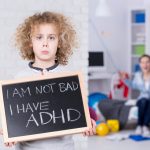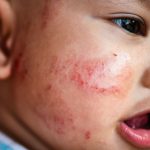Antidepressants in Pregnancy Tied to Autism Risk
By Sarah A LoBisco, ND
The Study
A recent Canadian study sought to examine if there was an associated risk for autism spectrum disorder (ASD) in children whose mothers used antidepressants during pregnancy.1-3 The researchers identified 145,456 singleton full-term infants from an ongoing population-based cohort that took place from 1998-2009, the Québec Pregnancy/Children Cohort. Antidepressant exposure was defined by trimester and antidepressant class.1 Assessment of medication use was based on mothers who had at least one prescription filled during their second or third trimester, a time of critical brain development.3 One thousand fifty-four children were identified with ASD based on at least 1 diagnosis between their date of birth and the last follow up. Boys outnumbered girls in diagnosis by 4:1.1
According to Health Day:
There were 4,724 infants exposed to antidepressants while their mother was pregnant; about 89 percent were exposed during the first trimester and 54 percent during the second or third trimester.
The researchers found that any antidepressant use in the second or third trimester seemed to increase autism risk by 87 percent. Earlier antidepressant use did not appear to have an effect.
SSRI use, in particular, more than doubled a child’s risk of autism, the study authors said. 2
The study concluded: “Use of antidepressants, specifically selective serotonin reuptake inhibitors, during the second and/or third trimester increases the risk of ASD in children, even after considering maternal depression.”1
This is not the first study to examine the link between autism with antidepressant use in mothers-to-be.5-6 Could it be that the rise in antidepressant use in mothers is impacting autism rates?3,4 Perhaps, but it is likely one of many factors.
The Many Epigenetic Considerations of Autism
Autism is a multifactorial disease and epigenetic influences during pregnancy can have profound effects on cognition and the developing brain. Antidepressants are one such epigenetic influence. Various studies have examined this impact.7-11
One study in 2012 stated:
So far, most studies investigated genes within the hypothalamicpituitary- adrenal (HPA) axis or the neurotrophin system. It is also of interest that current psychopharmacologic drugs including antidepressants, antipsychotics, and mood stabilizers may exert some of their effects by inducing epigenetic changes. Most notably, epigenetic alterations are potentially reversible and accessible for drug treatment, which lead to the development of novel classes of antidepressant drugs.8
In 2014, it was found antidepressants have an effect on DNA methylation:
The tricyclic antidepressants amitriptyline and imipramine but also the SSRI paroxetine, were shown to reduce promoter DNA methylation in rat primary astrocytes, possibly by reducing DNA methyltransferase 1 activity.57,58 The mood stabilizer and anticonvulsant valproate may induce a global reduction in DNA methylation levels, which was observed in human embryonal kidney cells and in rat hepatic cells.59,60 Additionally, the antipsychotics sulpiride and clozapine could activate DNA demethyiation in the frontal cortex and striatum.9
Furthermore, a 2008 study reported:
Chromatin modifications at specific BDNF promoters determine the differential expression of discrete BDNF splice variants. Such modifications have been observed in Alzheimer’s disease128 and can also be elicited by particular antidepressant drugs73.1-
However, it’s important to remember other factors of the mom and the baby’s environment can alter risk for autism and could be synergistic with modifications from antidepressants. For example, it was found that environmental stress can affect DNA methylation of a CpG rich promoter region of serotonin transporter gene (SLC6A4) in a nurse cohort.11
Another epigenetic modulator is diet.13 Certain nutrients are important for brain development and antidepressants decrease their availability.14 A study examining the role of “brain foods” reported:
These studies represent a starting point for understanding how intracellular signalling that is triggered by lifestyle factors can promote lasting changes in DNA function in the brain and in cognitive capacity. Silent information regulator 2 (SIRT2), a member of the sirtuin protein family, has emerged as an important modulator of genomic stability and cellular homeostasis that seems to act by silencing the function of specific genes. A diet that is high in saturated fat reduces the expression of SIRT2 in the rat hippocampus90, whereas a diet that is high in omega-3 fatty acids has the opposite effect2.13
Therefore, a mom who is depressed with a nutrient poor diet and is taking antidepressants could have three strikes against her baby’s epigenetic modification of his/her brain development. This could modulate the risk for health issues in the child.
The Root Cause of Depression
Furthermore, antidepressants may not be addressing the root cause of the depression, making epigenetic modifications a factor on top of underlying issues.14-19 For example, the cytokine theory of depression links uncontrolled inflammation or oxidative stress to depression.15 Immunotoxicity,15 genetic variations,16 alterations in the gut and microbiome,18-19exposures to pesticides,19-20changes in hormonal responses (which impact neurotransmitters),21and mitochondrial dysfunction24 are also considerations for addressing brain and cognitive health in mom and baby. If these factors are ignored, any epigenetic factors on top of them can increase risk for autism even more.
In summary there may be a link to antidepressants and autism risk due to the effect of the medication on epigenetics and this interaction many other factors.
Interestingly, I just read another study associating antidepressant use to risk for bipolar and manic episodes in users later on.25-26 The cycle of addressing a symptom with only looking at one possible mechanism and manipulating one pathway will continue to create other symptoms. This is why, as naturopathic and functional medicine practitioners, we can help stop the cycle by finding all the factors implicated and addressing the underlying cause.
 Sarah Lobisco, ND, is a graduate of the University of Bridgeport’s College of Naturopathic Medicine (UBCNM). She is licensed in Vermont as a naturopathic doctor and holds a Bachelor of Psychology from State University of New York at Geneseo. Dr. LoBisco is a speaker on integrative health, has several publications, and is a certification candidate in functional medicine. Dr. LoBisco currently incorporates her training as a naturopathic doctor and functional medicine practitioner through writing, researching, private practice, and through her independent contracting work for companies regarding supplements, nutraceuticals, essential oils, and medical foods. She has a small, private wellness consultation practice through telephone and Skype. Dr. LoBisco also enjoys continuing to educate and empower her readers through her blogs and social media.
Sarah Lobisco, ND, is a graduate of the University of Bridgeport’s College of Naturopathic Medicine (UBCNM). She is licensed in Vermont as a naturopathic doctor and holds a Bachelor of Psychology from State University of New York at Geneseo. Dr. LoBisco is a speaker on integrative health, has several publications, and is a certification candidate in functional medicine. Dr. LoBisco currently incorporates her training as a naturopathic doctor and functional medicine practitioner through writing, researching, private practice, and through her independent contracting work for companies regarding supplements, nutraceuticals, essential oils, and medical foods. She has a small, private wellness consultation practice through telephone and Skype. Dr. LoBisco also enjoys continuing to educate and empower her readers through her blogs and social media.
References:
- Boukhris, T, Sheehy O, MOttron L, Bérard A. Antidepressant use during pregnancy and the risk of autism spectrum disorder in children. JAMA Pediatrics. December 14, 2015. DOI: 10.1001/jamapediatrics.2015.3356
- Thompson D. Antidepressants in Pregnancy May Raise Autism Risk, Study Suggests. HealthDay. December 14, 2015. http://consumer.healthday.com/mental-health-information-25/antidepressants-news-723/antidepressants-in-pregnancy-may-rise-risk-of-autism-study-findsm-706132.html
- University of Montreal. Taking antidepressants during pregnancy increases risk of autism by 87 percent. Medical Xpress. December 14, 2015. http://medicalxpress.com/news/2015-12-antidepressants-pregnancy-autism-percent.html
- Centers for Disease Control and Prevention (CDC). Treating for Two. Data and Statistics. August 15, 2015. http://www.cdc.gov/pregnancy/meds/treatingfortwo/data.html
- Daigle D. Taking Antidepressants During Pregnancy May Not Raise Autism Risk. Health Day. November 25, 2013.
- Gordon S. Antidepressant use in pregnancy linked to autism risk in boys: Study. CBS News. April 14, 2014. http://www.cbsnews.com/news/antidepressant-use-in-pregnancy-linked-to-autism-risk-in-boys/
- Tsankova NM, Berton O, Renthal W, Kumar A, Neve RL, Nestler EJ. Sustained hippocampal chromatin regulation in a mouse model of depression and antidepressant action. Nat Neurosci. 2006 Apr;9(4):519-25. Epub 2006 Feb 26
- Menke A, Klengel T, Binder EB. Epigenetics, depression and antidepressant treatment. Curr Pharm Des. 2012;18(36):5879-89.
- Menke A, Binder EB. Epigenetic alterations in depression and antidepressant treatment. Dialogues in Clinical Neuroscience. 2014;16(3):395-404.
- Alasaari JS, Lagus M, Ollila HM, et al. Environmental Stress Affects DNA Methylation of a CpG Rich Promoter Region of Serotonin Transporter Gene in a Nurse Cohort. Chiariotti L, ed. PLoS ONE. 2012;7(9):e45813. doi:10.1371/journal.pone.0045813.
- Gómez-Pinilla F. Brain foods: the effects of nutrients on brain function. Nature reviews Neuroscience. 2008;9(7):568-578. doi:10.1038/nrn2421.
- Gómez-Pinilla F. Brain foods: the effects of nutrients on brain function. Nature reviews Neuroscience. 2008;9(7):568-578. doi:10.1038/nrn2421.
- Cass H. A Practical Guide to Avoiding Drug-Induced Nutrient Depletion. Nutrition Review Archive. April 22, 2013. http://nutritionreview.org/2013/04/practical-guide-avoiding-drug-induced-nutrient-depletion/
- Maes M. The cytokine hypothesis of depression: inflammation, oxidative & nitrosative stress (IO&NS) and leaky gut as new targets for adjunctive treatments in depression. Neuro Endocrinol Lett. 2008 Jun;29(3):287-91.
- Helen V. Ratajczak. Theoretical aspects of autism: Causes—A review. Journal of Immunotoxicology, 2011; 8(1): 68–79. Informa Healthcare. Accessed August 13, 2011. http://www.rescuepost.com/files/theoretical-aspects-of-autism-causes-a-review1-1.pdf
- Rebecca J. Schmidt,et al. Prenatal Vitamins, One-carbon Metabolism Gene Variants, and Risk for Autism. Epidemiology. 2011;22: 476–485. http://www.environmentalhealthnews.org/ehs/newscience/prenatal-vitamins-lowers-autism-risk
- Paul M. Why Antidepressants Don’t Work for So Many: Research finds cause of depression oversimplified, drugs aim at wrong target. October 23, 2009. Northwestern University Web site. http://www.northwestern.edu/newscenter/stories/2009/10/redei.html. Accessed November 7. 2013.
- Fehér J, Kovács I, Balacco G, Gabrieli C. Role of gastrointestinal inflammations in the development and treatment of depression. Orv Hetil. 2011;152(37):1477-1485. [Article in Hungarian]
- A randomized controlled trial to test the effect of multispecies probiotics on cognitive reactivity to sad mood. Brain, Behavior, & Immunity. August 2015. (40): 258–264.
- Turning the gut microbiome into a chat room. Science News. March 179, 2015. https://www.sciencenews.org/article/turning-gut-microbiome-chat-room
- Goodman B. Pesticide Exposure in Pregnancy Tied to Autism Risk. Health Day. June 23, 2014. http://www.webmd.com/baby/news/20140623/study-links-pesticide-exposure-during-pregnancy-to-autism-risk-in-kids?page=2
- Gore, V. A. Chappell, S. E. Fenton, J. A. Flaws, A. Nadal, G. S. Prins, J. Toppari, R. T. Zoeller. Executive Summary to EDC-2: The Endocrine Society’s Second Scientific Statement on Endocrine-Disrupting Chemicals. Endocrine Reviews. 2015; er.2015-1093 DOI:10.1210/er.2015-1093.
- Barth C, Villringer A, Sacher J. Sex hormones affect neurotransmitters and shape the adult female brain during hormonal transition periods. Frontiers in Neuroscience. 2015;9:37. doi:10.3389/fnins.2015.00037
- Rossignol DA, Frye RE. Mitochondrial dysfunction in autism spectrum disorders: a systematic review and meta-analysis. Molecular Psychiatry. 2012;17(3):290-314. doi:10.1038/mp.2010.136.
- Rashmi Patel et al. Do antidepressants increase the risk of mania and bipolar disorder in people with depression? A retrospective electronic case register cohort study. BMJ. 2015. DOI: 10.1136/bmjopen-2015-008341.
- British Medical Journal. Certain antidepressants linked to heightened risk of mania and bipolar disorder. Medical Xpress. December 15, 2015. http://medicalxpress.com/news/2015-12-antidepressants-linked-heightened-mania-bipolar.html










